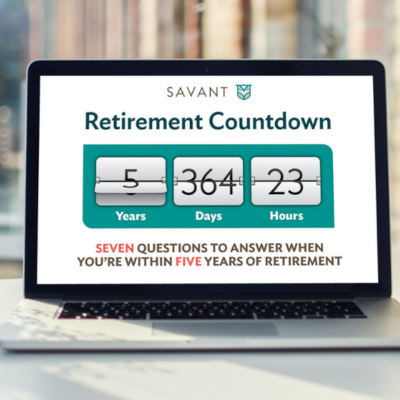Remembering Daniel Kahneman: Psychological Behavioral Insights to Retire Smarter

The recent death of Nobel laureate Daniel Kahneman, author of Thinking, Fast and Slow, marks a great loss for psychology and economics. His groundbreaking work on cognitive biases and decision-making offered invaluable wisdom for retirees navigating the investment landscape while preserving wealth and generating income.
Kahneman exposed biases like overconfidence, loss aversion, and availability effect that can cloud judgment and lead to poor investment decisions. By learning to recognize these biases, retirees can make more informed, rational choices to help their savings last through retirement.
Here are four key lessons to consider from Kahneman’s research, along with actionable tips designed to help retirees invest more confidently and resiliently.

Want to Retire Smarter?
Nearing retirement brings excitement for a new chapter but also anxieties about planning. Our guidebook offers strategies to address common challenges people face as they approach this transition. Understanding these challenges can help equip you to make sound decisions as you embark on this exciting new phase.
Lesson 1: Beware of Overconfidence
Most of us tend to be overconfident in our abilities – whether it’s intelligence, humor, or athletic prowess. Kahneman exposed this overconfidence bias, in which we have unwarranted faith in our skills. For investors, it can manifest as overreliance on personal analysis while disregarding public information. This false belief of being able to time the market or pick winners often leads to risky decisions. Adopt a more conservative, diversified approach focused on long-term stability over short-term gains.
Actionable Tip: Focus on long-term, evidence-based investing strategies rather than trying to time the market or pick individual stocks. A financial advisor can help you develop a well-balanced, diversified portfolio aligned with your risk tolerance and retirement goals.
Lesson 2: Combat Loss Aversion
Kahneman’s research highlights how individuals disproportionately fear losses compared to how much they value gains – a principle known as loss aversion. For retirees, this can manifest as a reluctance to sell losing investments in hopes of breaking even while selling winners prematurely to avoid potential losses. This practice of holding losers and selling winners can make a portfolio less efficient than one based on fundamental analysis. Understanding this bias can empower retirees to make more balanced decisions, recognizing that some level of risk is necessary for portfolio growth.
Actionable Tip: Periodically revisit your investment plan with your financial advisor to ensure it aligns with your goals and accounts for any changes in your risk tolerance. Don’t let the fear of losses lead to an overly conservative approach that may hinder long-term growth.
Lesson 3: Recognize the Availability Bias
Kahneman’s research highlights availability bias, in which individuals overestimate the likelihood of events they easily recall. This bias can lead investors to make suboptimal decisions, such as avoiding investments after a market crash or favoring familiar brands heavily covered in media. For retirees, availability bias may manifest through limiting investment options based on familiarity or failing to diversify adequately due to a narrow personal experience. Recognizing and mitigating this bias is crucial for sound investment decisions.
Actionable Tip: Be mindful of availability bias when making investment decisions. Consider consulting with your financial advisor and look at historical data and economic evidence, rather than being swayed by recent events or media hype when making investment decisions. Maintain a long-term, disciplined approach.
Lesson 4: Embrace Slow Thinking
One of Kahneman’s most famous distinctions is between fast and slow thinking. Fast thinking involves quick judgments and decisions, often driven by emotion. Slow thinking is more deliberate and logical. In the context of investing, retirees should embrace slow thinking and thoroughly analyze their finances and investments to avoid impulsive decisions that may be detrimental to their retirement goals.
Actionable Tip: Consider working with a financial advisor to develop a comprehensive retirement plan tailored to your specific goals and risk profile. Once you have a plan, remain disciplined and avoid impulsive decisions based on market fluctuations or sensationalized news. Regularly review your plan, but resist the urge to make major changes driven by emotion rather than logic and evidence.
Daniel Kahneman’s groundbreaking work provides invaluable insights into the human psyche and decision-making processes. By understanding and applying his lessons, we believe retirees can navigate the investment world with greater wisdom and confidence, helping to improve their financial stability and peace of mind in their golden years.
This is intended for educational purposes only and should not be construed as personalized investment advice.

